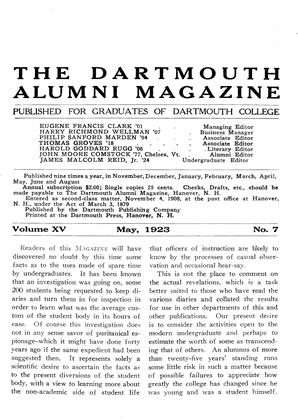Possibly one of the reasons why President Ernest M. Hopkins of Dartmouth is such a successful leader is because he is not at all disturbed by the so-called deviltries of the younger generation. He is young enough himself to have faith in the young men of today, and he is old enough to know that the older generation was not exactly perfect. Just to show you what is in his mind, let me share with you a couple of paragraphs from a personal letter which I received from him a short time ago:
"I presume it is a very old story, but my father, who was a minister, and whose stories were minister's stories, used to tell me a story of Spurgeon and a young minister who was to hold forth in Spurgeon's pulpit. The young clergyman was very self-confident and very cocky and rather obviously heedless of some of the suggestions which Mr. Spurgeon made to him before the service, and he began his presiding over the congregation in this spirit and with this attitude.
"Gradually, however, the size of the auditorium and the responsibility of his functions came to him and finally he almost completely collapsed and ended the whole thing in a funk.
"In great humiliation of spirit he later apologized to Mr. Spurgeon for his previous attitude, whereupon the great preacher replied to him:
"'If you had gone up into the pulpit the way you came down out of it, you would have come down out of it the way you went up!'
"In justice, however, to the college men of the present generation, I am bound to say that, as I see them at Dartmouth, they are less bumptious and more modest than they were in my day twenty-five years ago. Likewise, they drink less hard liquor, swear less hard cuss words, live cleaner lives and forego chewing tobacco, all of which things are details, but nevertheless manifest a general tendency which is desirable.
"One sure thing I hold to, and that is that this generation of youth, as I see them in the undergraduate body, is sufficient justification for optimism, even when one becomes impatient with many of his elders and distrustful of many of his own generation. 'Billy' Phelps of Yale says that middle age and old age are always critical of youth because they are jealous of it, and I am inclined to think that this is a true diagnosis. There is a certain cockiness. and self-assuredness that goes with youth that is probably a rather essential detail of self-confidence, but I do not object nearly as much to these qualities in youth, who after all feel a certain responsibility to justify these attitudes, as I do to the bigoted and intolerant group of elders who mistake their achievements in single spheres for certificates of omniscience in all that has to do with the world's affairs. When all is done and said, any youth may go through to accomplishment which shall be of the supremest importance in its service to mankind, whereas very few of us who are their elders have shown ability to do so."
(From The Treasure Chest) Edited by THOMAS DREIR
 View Full Issue
View Full Issue
More From This Issue
-
 Article
ArticleReaders of this MAGAZINE will have discovered no doubt
May 1923 -
 Article
ArticleRAMBLING THOUGHTS OF A CLASS SECRETARY
May 1923 -
 Article
ArticleMEMORIES OF BENJAMIN A. KIMBALL
May 1923 By SAMUEL L. POWERS '74 -
 Class Notes
Class NotesCLASS OF 1911
May 1923 By Nathaniel G. Burleigh -
 Class Notes
Class NotesCLASS OF 1919
May 1923 By John H. Chipman -
 Class Notes
Class NotesCLASS OF 1910
May 1923 By Whitney H. Eastman
Article
-
 Article
ArticleNOMINATIONS FOR ALUMNI COUNCIL TO BE VOTED UPON
March, 1922 -
 Article
ArticleQUINQUENNIAL
February 1933 -
 Article
ArticleComing Events
February 1943 -
 Article
ArticleHottest ticket in town
JANUARY/FEBRUARY 1985 -
 Article
ArticleGrant x2
September 1995 -
 Article
ArticleCOLOMBIAN ALUMNI HAIL ROCKEFELLER
December 1942 By John E. Leggat '45

